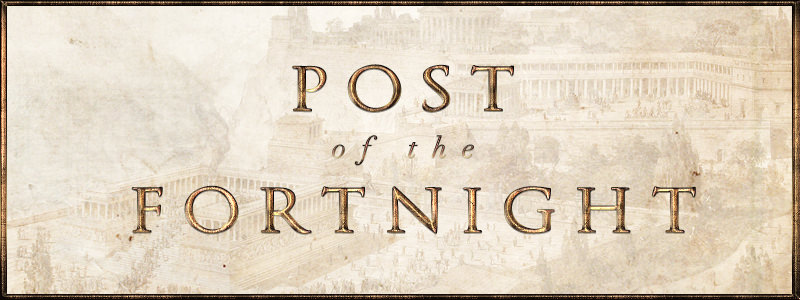
Originally Posted by
Kyriakos

There was also the isopolity between Thebes and Megara: two states, one voice (

)
I think this touches on an interesting point about Hellenic state extension.
Athens established a larger version of itself through synoikos, binding the attic plain into the Polis of Athena (seen as a victory for the demos over the aristoi in traditional historiography). IIRC Thebes briefly imposed something similar on Boeotia in their all too brief hegemony.
I suspect Argos had imposed something similar in at least part of the Argolid as it was such a wealthy and powerful state until repeatedly kicked down by Sparta-there's a link between states conducting a Synoikism and a move to democracy (along with the rise of the hoplite) so possibly it was undertaken by the populist anti-oligarchic Tyrant-King Pheidon?
Sparta conversely imposed direct rule by the Spartiates on the perioiki, and together on the Messenians probably representing a victory of a military faction of old farme-soldiers over the royalty, oligarchy and demos alike.
Both models proved to be local powerhouses capable of regional importance at times (Athens Argos Thebes and Sparta all had their moment in the sun) but none was able to impose lasting hegemony over a substantial portion of Hellas.
This contrasts with the monarchies of Makedon and Persia, based on the King as nexus of personal loyalties, justice and military leadership. Persia established long term rule over many Hellenic city states in Ionia, and was able to decisively interfere in Hellas proper (eg supporting Sparta to victory over Athens): their one significant foray deep into Hellas saw many locals swear allegiance and they were only defeated by an unusual combination of traditional enemies and some pretty strong leadership. The Persian model sustained an extensive empire outside Hellas that was reasonably stable for a couple of centuries.
Makedon as also able to impose rule over much of Hellas proper for several centuries and dominate the rest through the "fetters of Greece". Famously Alexander III exported the Makedonian monarchic model to the Persian Empire where it was less stable and supported smaller fractions of territory than the Great King had typically ruled.
This model was sustained by the ability of its monarch more than anything else: I would argue only Alexander I and Philip II imposed seriously persistent institutions that persisted beyond their deaths. Typically infants or incompetent kings were killed and able relatives (or later just generals) took power in the state. I think state persistence was tied in Makedon to the traditional aristocracy (in Makedon proper, typically they chose the king from among their number) and the army (which came to choose the kings especially the first generation of diadochi).
The Persian monarchy was sustained by Median warrior culture (similar to but on a much larger scale to Makedonian aristocratic warrior culture) and existing Mesopotamian Imperial appartus like the Aramaic speaking administrative class. I think the diadochi were also supported by a wider Hellenic educated culture as well, surely the Mouseion and other libraries supported a literate administrative elite.
Perhaps there was a moment in the archaic period when successful synoikic states could have spread their model further but AFAIK these movements never jumped dialect lines (Argives and Korinthians were both Doric, all the other synoikists were of the same language group too).
This archaic model worked very well for the Romans and they seem to have just continued to use it, albeit less discriminatingly. As a Hellenised city state they were exposed to ideas like Synoikos both second hand through the Hellenophile Etruscans and directly through their Campanian neighbours like Neapolis. However Roma was formed (three tribes? or a fusion of Latin and Sabine villages?) for some reason they decided to continue the synoikic process.
Its possible that like so much of the Roman political inheritance it was imposed by an Etruscan conqueror. I favour the theory that Rome was "made" when the last of the Tarquins was defeated by Lars Porsena who imposed the rule of several (three?) Praetors (local Quislings retconned as anti-monarchic Consuls by Livy) and he may have extended their power over a wider portion of Latium. When Porsenna as defeated by the Latin league the new Roman establishment clung to power, resisting a return to royal rule or surrendering annexed territory; of course that's all imagination, the real events are lost to us.
However it happened Rome started with more than one "domestic culture" so uniting with Latin and Sabine communities was possible: there was also elite Etruscan elements in the city from its earliest days as well. There was no seal of purity (that is to say obstinate chauvinism) preventing other cultures joining as well. It seems to have allowed for both communities and individuals to become Roman: this is demonstrated well by the naturalisation in the 5th century of the Oscan Attius Clausus as Appius Claudius, ancestor of the Claudian gens and the family that returned Rome to Monarchy.
The nexus of isonomy and elected magistrates and synoikos is found in Rome as in Athens. perhaps the availability of access to mpower increases a general level of competence, as well as satisfaction? Whatever the case, it worked.
I 'd argue the mixed (and less than elite) culture of Rome's original population made Borging others easier. The Attic plain, the Argolid and the valley of the Eurotas proved the true boundaries of their respective polities, whereas the Tiber eventually flowed from windswept Prytain to hoary Kemet, and lapped the shores of Iberia and...umm...Iberia...
once you achieve enough wins, but first you must be nominated in threads such as this one. And it works like this.

























































